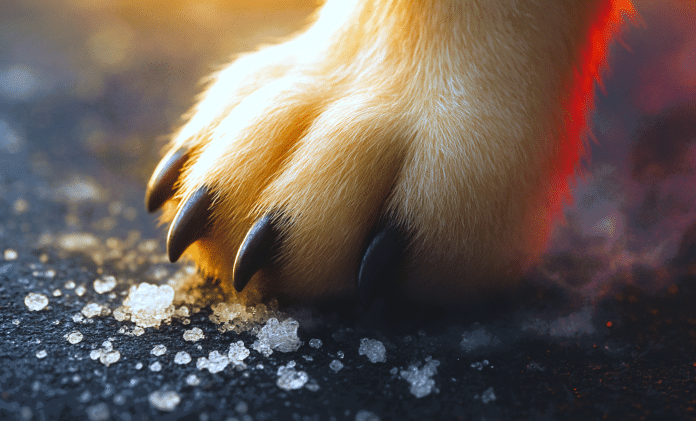Baltimore, MD – As the first round of ice and freezing rain approaches Maryland, veterinarians are warning pet owners to take precautions before heading out on winter walks. While temperatures may only hover near freezing, the road salt and de-icers used to prevent slick conditions can burn paw pads, irritate skin, and cause toxic reactions if pets lick or ingest them.
Most ice-melt products contain sodium chloride, calcium chloride, or magnesium chloride, chemicals that melt ice quickly but are rough on paws. Prolonged contact can cause redness, cracking, or burns, and when pets lick their paws afterward, they risk ingesting harmful levels of salt. Symptoms of salt poisoning include vomiting, diarrhea, excessive thirst, or lethargy, and in more serious cases, seizures or kidney damage.
Veterinarians also note that some de-icing products contain heavy metals or industrial residues, making them even more dangerous when used repeatedly throughout the season. Small dogs and those with thinner coats are especially vulnerable to chemical irritation and hypothermia when walking on treated surfaces.
To protect pets, experts recommend rinsing paws with warm water after every walk and drying them thoroughly. A protective paw balm or wax can create a barrier against irritation, while trimming fur between toes helps prevent buildup of salt and ice. Booties are another option for pets that tolerate them. Homeowners should use chloride-free, pet-safe ice melts around driveways and entryways to minimize exposure.
With temperatures expected to drop below freezing across much of Maryland through the weekend, pet owners are advised to stay alert for limping, paw licking, or reluctance to walk on salted areas. Even brief exposure to chemical ice melt can cause discomfort or injury.
As ice and frost settle across the region, veterinarians emphasize that the biggest threat to pets this time of year isn’t just the cold—it’s what’s on the ground beneath their paws.





